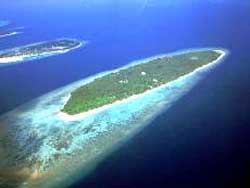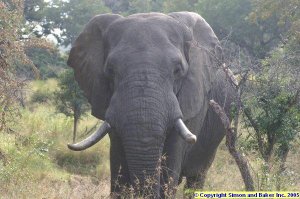by Editor | Jan 21, 2006 | Luxury Travel

An attol in the Maldives
Male – Tourists are complaining to the Maldivian Tourism Ministry because Maldivian tourism has increased and resorts are overbooked. Tourism started to show signs of improvement during the last weeks of last year, following the huge drop in tourists after the December 26, 2004 tsunami.
Even though the average occupancy of August was 56.5 percent, some resorts stopped bringing in tourists because they were full. Some international tourist operators forewarned that with the beginning of this year the resort occupancy of resorts will increase and the problem of overbooked resorts might arise.
The Maldivian Tourism Ministry said in an announcement that since there is overbooking and tourists are complaining booking must be done according to the law. The Ministry said that 15,182 beds from 78 resorts are being used by tourists. While 12,788 beds were used during January of last year, the number of beds used during January of 2004 was 16,088.
The resorts overbooked at the moment are on Male atoll, on atolls close and far away from Male. Sun Island Resort with 426 rooms is the resort with the highest number of beds and has a current occupancy higher than 95 percent. Sun Island’s manager Abdurrasheed said that to prevent the problem of overbooking bookings have been controlled somewhat.
One and Only Reethi Rah Resort, one of the most expensive resorts in Maldives, said that since December 2005, its occupancy has been 100 percent. the One and Only Reethi Rah has 130 rooms. Some tourists had to leave the Maldives during December 2003 without holidaying because resorts were overbooked and full.
To learn more about the Maldives, go to Maldives and for information on the island resort we visited, go to Royal Island
by Editor | Nov 24, 2005 | Luxury Travel

Kruger National Park Elephant
Elephant families in the Kruger National Park are facing the gallows as South Africa’s Minister of Environmental Affairs and Tourism appeals for national and international support of the plan to cull thousands of elephants over the next five years.
South Africa (PRWeb) November 24, 2005 — Elephant families in the Kruger National Park are facing the gallows as the Minister of Environmental Affairs and Tourism in South Africa, Marthinus van Schalkwyk is appealing to national and international communities to support for the plan proposed by the South African National Parks Board (SANparks) to cull thousands of elephants over the next five years. Census takers estimate that close to 12,500 elelphants live in the Kruger National Park. Until 1995 culling was used to maintain the elephant population within the carrying capacity unofficial of the national park (approximately 7, 500 elephants), when it was stopped due to national and international opposition.
“While the concept of a static carrying capacity within a dynamic environment has no scientific basis, the idea that Kruger can only support a population of 7,000 elephants has nevertheless become deeply entrenched within the minds of the general public.” Michelle Henley, Associated Private Nature Reserves.
The proposal indicates that culling is needed to conserve the biological diversity in protected areas and to support sustainable use of natural resources for the benefit of communities, such as processing carcasses, canning plants and butcheries, and in carving tusks and bones, elephant hair products and other by-products. The problem is that elephants are inefficient feeders in their physical taking of vegetation and also digestively. Elephants only digest some 40 percent of what they eat and being of such immense size, they require at least 170 Kg (470 lb.) of plant matter daily. Elephants are both browsers and grazers, utilising a very wide range of plants. Grasses are most often taken just after a rainy season, with trees and browse (leaves) making up the majority of their diet.
When eating off a tree, the leaves as well as bark and occasionally the roots are taken. This often has a real detrimental effect on the tree, especially when a whole tree may be pushed over just to reach the choice new growth in the canopy, which may lead to large areas of woodland being severely damaged. Eventually this will impact on their numbers, but the destruction is first felt by lesser browsing species such as antelope. However, in areas where severe bush encroachment has taken place, especially by Mopane (their favourite tree), elephant are quite beneficial, improving the habitat by opening up dense woodland for other species.
“Culling is a cruel, unethical and a scientifically unsound practice that does not consider the welfare implications to elephant society as a whole. Elephants are extremely intelligent, social and grieve tremendously for the loss of family members.” The International Fund for Animal Welfare (IFAW) are calling readers to sign an online petition that will be sent to the South African High Commissioner. Founded in 1969, IFAW is an international animal welfare and conservation organization that works to protect wild and domestic animals and to broker solutions that benefit both animals and people. With offices in 15 countries around the world, IFAW works to protect whales, elephants, great apes, big cats, dogs and cats, seals, and other animals.
Alternatives for culling have been suggested, such as contraceptive measures and increasing the borders of the national parks. The Kruger National Park is part of a transfrontier park, the Great Limpopo Transfrontier Park, a joint initiative between Mozambique, South Africa and Zimbabwe. “I would rather not do culling, and this is the view of the government as well. But there comes a time when not doing anything is not good enough,” said van Schalkwyk.
To learn more about the petition and support their efforts visit their website at http://www.ifaw.org. For more on the Kruger National Park read our article at http://simonandbaker.com/kruger
by Editor | Oct 17, 2005 | Luxury Travel

Josette King, travel writer and photographer
Josette King recently spent some time deep in the Peruvian Amazon. Look for her write ups and photos of the Amazon and the eco oriented Tahuayo Lodge as she shares her impressions and her journey of discovery.











